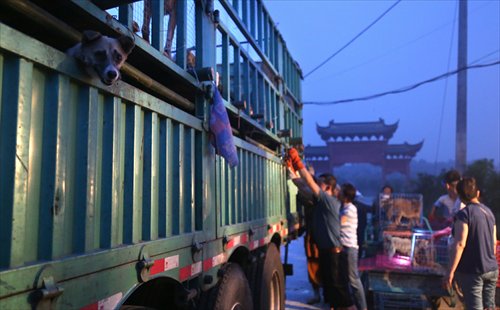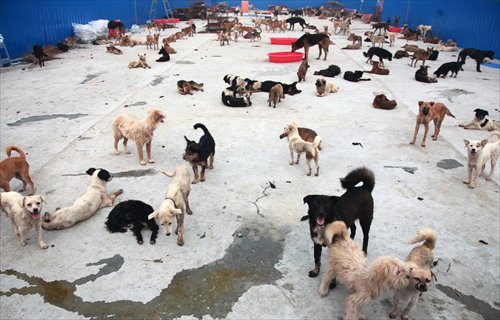Rescued animals are dying as funds, volunteers dwindle

Volunteers unload rescued dogs in Yangzhou on July 4. Photo: CFP

Dogs rescued from Yulin, the Guangxi Zhuang Autonomous Region stay in a shelter in Yangzhou, Jiangsu Province on July 4. Photo: CFP
Nearly two months after more than 1,300 dogs were saved from being slaughtered to feed visitors to the Yulin Dog Meat Festival and were sent to an animal shelter in the small city of Gaoyou, Yangzhou, Jiangsu Province, only about 440 of them are still alive.
Due to insufficient medical care, many of them have died of disease.
"Some 200 dogs died on the day of their arrival on July 4," Chang Le, a volunteer at the shelter, named Hushengyuan, told the Global Times.
Worse still, the shelter, which relies on public donations to support its daily operations, has recently seen a dramatic decrease in donations and the number of people volunteering to help them.
Observers said that many private animal rescue centers are suffering from financial difficulties, and animal shelters and activists should cooperate with their local governments to provide a sustainable network to help rescued animals.
Pet peeve
The shelter, located in a remote village near Gaoyou, is also home to many other rescued animals including horses, pigs, cows and foxes.
The shelter called on pet lovers to adopt the dogs or take care of them in the shelter twice on its WeChat page in July and August. Apparently, this did not work well.
"Now the shelter only has five volunteers," Chang said, adding that the shelter then hired some local villagers to take care of the dogs, but they can only feed the dogs.
"In the first few days after those dogs arrived, we received many donations ranging from medicine to dog food every day, and also many pet lovers across the country came to help us, but now we have not seen any pet lovers for some time, and the donations now only come every few days," Chang said.
According to him, 1,300 dogs were purchased by animal activists for 500,000 yuan ($78,500) during the Yulin Dog Meat Festival in the Guangxi Zhuang Autonomous Region, a carnival-like festival in which people have devoured dog meat and lychees and drunk liquor annually since the 1990s.
The festival has come under more and more public criticism for allegedly violating animal rights in recent years. The shelter took in 400 rescued dogs around last year's festival.
Now about 40 sick dogs live in individual kennels at the shelter, and the other 400 are crammed unto six enclosed areas, according to Chang.
"As there is no vet, many sick dogs died eventually," Chang said, adding that a lot of people are put off from coming to work in the shelter by its remote location.
According to the Nanjing-based Modern Express, the shelter has to pay more than 100,000 yuan in rent every year, and it lacks the around 200,000 yuan it needs to fulfill its plans to expand.
Other animal shelters also face this dilemma. The Beijing-based China Small Animal Protection Association accepted 500 dogs that were rescued by animal rights activists while on their way to a slaughterhouse in 2011, and has been struggling to pay for necessary medical help for those dogs ever since. The association was later sued by several animal hospitals for failing to pay their bills.
Shelters in need of support
Zhang Zhengzhong, director of the Gaoyou government's veterinary office, told the Modern Express that the dogs should have been returned to Yulin as they lack the legally-required documents that are needed to prove they have been quarantined.
Although the office sends people to check conditions at the shelter daily, dogs still die frequently.
Dogs are prone to infections if many of them live together in one kennel, and a shelter like Hushengyuan needs dozens of vets to take care of its animals, Zhang Xu, who owns a pet clinic in Hangzhou, Zhejiang Province, told the Global Times.
"The priority is to quarantine and sterilize those dogs, and then have them adopted," Zhang said.
Hu Xiaowu, a sociologist at Nanjing University, said that accepting such a huge number of dogs poses a big challenge for a shelter in terms of its management, finance and rescue ability, according to the Modern Express.
"We respect the rescue, but private rescue forces alone lack sustainability," Hu was quoted as saying.
Zhang said that animal rights activists and animal shelters should seek help from the government, which could send vets from government-backed institutions to treat rescued animals and provide subsidies to support the long-term operation of shelters.
Newspaper headline: Destitute doghouse